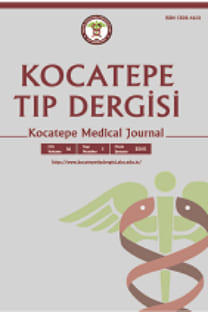TOTAL DİZ REPLASMANI UYGULANAN STERİL HAZIR TURNİKE İLE PNÖMOTİK TURNİKENİN AMELİYAT SONRASI DÖNEMDE DERİN VENTROMBOZU OLUŞUMU YÖNÜNDEN KARŞILAŞTIRILMASI
steril turnike, total diz artroplastisi, derin ven trombozu
COMPARSION OF DEEP VENOUS THROMBOSIS BETWEEN USING READY TO USE STERILE TOURNIQUET AND PNEUMATIC TOURNIQUET AT TOTAL KNEE ARTHROPLASTY SURGERY
___
- Berry DJ, Bozic KJ. Current practice patterns in primaryhip and knee arthroplasty among members of the American association of hip and knee surgeons. J Arthroplasty 2010; 25(6 Suppl):2–4.
- Norman D, Greenfield I, Ghrayeb N, et al. Use of a new exsanguination tourniquet in internal fixation of distal radius fractures. Tech Hand Up Extrem Surg 2009;13(4):8.
- Silverstein MD, Heit JA, Mohr DN, et al. Trends in the incidence of deep vein thrombosis and pulmonary embolism: a 25-year population-based study. Arch Intern Med. 1998;158(6):585-93.
- David H. Green. Green’s Operative Hand Surgery . Ed.3 Vol: 1, New York: Churchill-Livingstone, 1993: 5-11.
- Shaw JA, Murray DG. The relationship between tourniquet pressure and underlying soft-tissue pressure in the thigh. J Bone Joint Surg Am. 1982;64(8):1148-52
- Barnes RW, Nix ML, Barnes CL, et al: Perioperative asymptomatic venous thrombosis: role of duplex scanningm versus venography. J Vasc Surg 1989;9:250–61.
- Woolson ST. The resolution of deep venous thrombosis that occurs after total joint arthroplasty. A study of thrombi treated with anticoagulation and observed by repeat venous ultrasound scans. Clin Orthop 1994;299:86–91.
- Cheng KK, Lai ST, Yu TJ, et al. Postoperative deep veinö thrombosis in the Taiwanese Chinese population. Am J Surg 1987;153:302–5.
- Nandi P, Wong KP, Wei WI, et al. Incidence of postoperative deep vein thrombosis in Hong Kong Chinese. Br J Surg 1980;67:251–3.
- Chau KY, Yuen ST, Ng TK, et al. An autopsy study of pulmonary thromboembolism in Hong Kong Chinese. Pathology 1991;23:181–4.
- Feldman V, Biadsi A, Slavin O, et al. Pulmonary Embolism After Application of a Sterile Elastic Exsanguination Tourniquet. Orthopedics. 2015;38(12):e1160-3.
- Parmet JL, Horrow JC, Berman AT, et al. The incidence of large venous emboli during total knee arthroplasty without pneumatic tourniquet use. Anesth Analg 1998, 2(87):439–444.
- Desai S, Prashantha PG, Torgal SV, et al. Fatal pulmonary embolism subsequent to the use of Esmarch bandage and tourniquet: a case report and review of literature. Saudi J Anaesth. 2013; 7(3):331-335.
- Zahavi J, Price AJ, Westwick J, et al. Enhanced in-vivo platelet release reaction, increased thromboxane synthesis, and decreased prostacyclin release after tourniquet ischaemia. Lancet 1980; 8196(2):663–667.
- Katsumata S, Nagashima M, Kato K, et al. Changes in coagulation-fibrinolysis marker and neutrophil elastase following the use of tourniquet during total knee arthroplasty and the influence of neutrophil elastase on thromboembolism. Acta Anaesthesiol Scand 2005; 4(49):510–516.
- Brin YS, Feldman V, Ron Gal I, et al. The Sterile Elastic Exsanguination Tourniquet vs. the Pneumatic Tourniquet for Total Knee Arthroplasty. J Arthroplasty. 2015;30(4):595-9
- ISSN: 1302-4612
- Yayın Aralığı: Yılda 4 Sayı
- Başlangıç: 1999
PRİMER RETROPERİTONEAL TÜMÖRLERDE KLİNİK DENEYİMLERİMİZ
Tamer SEKMENLİ, İlhan ÇİFTÇİ, Doğan KÖSE, Yavuz KÖKSAL, Nevin SEKMENLİ
SAFRA KESESİNİN PÜR MÜSİNÖZ ADENOKARSİNOMU: OLGU SUNUMU
Mehmet Nuri KOŞAR, Nuray Ayper ÖNGEN, Mani HABİBİ, Faruk GÜLEÇ, Osman Zekai ÖNER
Neşe KILIÇ, FAHRETTİN AKYÜZ, Neslihan TEKİN ÇÜRÜK
POSTERİOR İNTEROSSEÖZ SİNİRİN KISMİ FELCİ
Mehlika PANPALLI ATEŞ, HURİYE HAYAT GÜVEN, Sevgi FERİK, Selim Selçuk ÇOMOĞLU
DERYA GÜZEL ERDOĞAN, Sinem SAĞ, Mustafa Serdar SAĞ, İBRAHİM TEKEOĞLU, AYHAN KAMANLI, KEMAL NAS
OPERE LOMBER DİSK HERNİSİ SONRASI VERTEBRAL OSTEOMYELİT GEÇ KALINMIŞ VAKA: OLGU SUNUMU
Serhat YILDIZHAN, Mehmet Gazi BOYACI
MEMENİN TAŞLI YÜZÜK HÜCRELİ KARSİNOMU
GELDANAMİSİN VE TRİKOSTATİN A’NIN İNSAN MESANE KANSERİ HÜCRELERİ ÜZERİNE SİNERJİSTİK ETKİSİ
